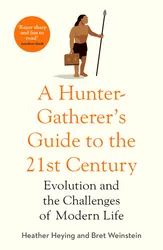The environment that most of us live in today is radically different than the environment that homo sapiens occupied during our evolution, and there are many aspects of our modern lifestyles that work against what our bodies and minds evolved to be adapted to. Although we are a very flexible and adaptable species, perhaps these differences can account for some of the illnesses and discomfort that many of us experience in the 21st century western civilization that we find ourselves in.
At first glance, this book looks like it will take a scientific approach to this issue, and provide sensible, useful advice for modern humans living with the legacy of an evolutionary history spent largely in a hunter gatherer lifestyle. Unfortunately, it didn’t live up to my expectations. Instead, we get a series of essays on various topics, in which the authors give their opinions, of which they have many.
Near the beginning of the book, they completely misunderstand the concept of the “meme” (as first described in The Selfish Gene) and come up with something they call the “Omega Principle”. They say “Epigenetic regulators, such as culture, evolve to serve the genome”, disagreeing with Dawkins who (rightly in my opinion) says that memes have no particular tendency to serve the genome. They don’t back this assertion up with any evidence, nor do they consider and address counter examples. By the end of the book, their formulation of the omega principle has softened slightly, and they suggest that long lasting cultural behaviours should be assumed to be adaptive, rather than that all cultural behaviours are definitely adaptive.
They seem to think that culture (memes) will end up serving the interest of the genes because genes have the ultimate control over what cultural memes get transmitted, so that any that do not benefit the genome would get weeded out. But they also say that culture mutates much faster than genes, without explaining how genes are able to keep up with them. By the time a silly idea has spread, either all the organisms have died out, or there will be a different idea spreading, and now the genes will have to mutate again in order to stop it. So this idea doesn’t make much sense.
To me, it makes much more sense to assume that our flexible brains have evolved because in a changing world the optimium survival behaviour changes too quickly for our genes to keep up. Our genes have effectively outsourced the short term decision making to our brains, and they retain no control over our behaviour except to give us higher level aims like “eat”, “sleep”, “reproduce” etc. How we achieve these aims, and what ideas we receive and pass on from other humans in the form of culture, isn’t really within the influence of our genes any more. This means that memes can spread around more or less irrespective of their effect on the survival of genes. Much like viruses, if a particularly fatal meme starts spreading, it would probably die out quickly because it would kill all its hosts before they could spread the meme to others. But a lot of memes are going to be more like the common cold; not adaptive or helpful to the genes in any way, just a passenger replicating of its own accord, using the machinery of the body (infected cells that produce virus particles in the case of the virus; our voices, bodies and sensory organs to spread ideas, in the case of the meme). We don’t assume that the common cold is adaptive, so why should we assume that culture (i.e. long lasting memes) is?
I found the chapters on sex and parenting to be overly preachy, especially on their view that monogamy is the “superior reproductive system” for everyone. They are not even particularly careful to restrict this to humans, so presumably all the non-monogamous organisms on earth are doing it wrong. The preachiness continues in other chapters. I found myself agreeing with the authors sometimes, disagreeing others, but their points mostly just felt like opinion, with no particular grounding in science. It seems more like they have an agenda they want to put across, and they’ve tried to wrap it up in evolutionary terms.
They come up with a lot of neologisms in this book, including describing the effects of pornography on developing brains as “sexual autism”. They then go on to explain that they mean no offence to autistic people with this phrase, but then why use it at all? It makes me wonder if they are deliberately trying to cause offence.
I did not like this book. The authors’ thinking is confused, and they seem to be pushing their own personal agenda and opinions. Where they have original ideas (and they do have a few) they don’t explain them rigorously enough for them to really make sense or be falsifiable in a scientific sense. Their advice is often banal or wrongheaded. Sometimes it bears no relation to the preceding chapter. For example, in one of the advice sections they advise us to “smile at people” despite not mentioning this at all in the preceding chapter. I got so annoyed with it that I wanted to throw this book across the room at several points! (I didn’t because my copy came from the library!)
I could imagine a book examining in detail the ancestral environment that humans evolved in, what adaptations (both physical and behavioural) we retain from that period, how our modern world differs from that ancestral environment, what effects this could be having on our well-being, and what we might be able to do to mitigate these problems. That would be an interesting and potentially valuable book to read. Unfortunately, this is not that book. It’s a confused, opinionated, preachy book that was a waste of my time to read.
